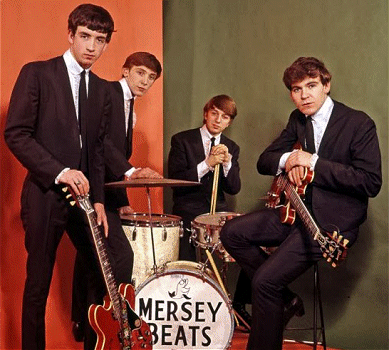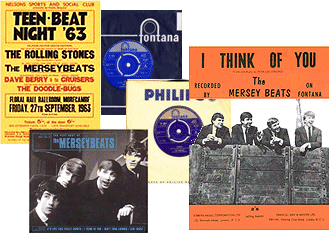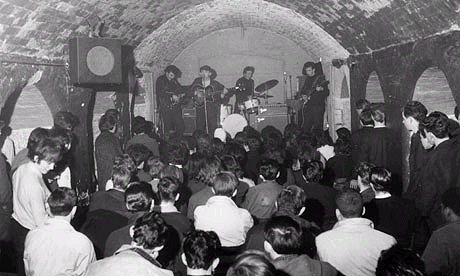Sixties
City presents
a wide-ranging series of
articles on all aspects of the Sixties, penned by the creator of the iconic
60s music paper Mersey
Beat
|
Sixties
City presents
a wide-ranging series of
articles on all aspects of the Sixties, penned by the creator of the iconic
60s music paper Mersey
Beat
|
|||||
|
 |
The
group were originally called The Mavericks when they formed in 1960. Then
they changed their name to The Pacifics. At the beginning of 1962, together
with Cavern disc jockey Bob Wooler,
two of the members, Tony Crane and Billy Kinsley, approached me as I’d
created the name Mersey Beat and had it under copyright,
and asked my permission to change their name to The Mersey Beats.
Bob Wooler pointed out that there was a group called the Melody Makers, which was good publicity for the Melody Maker and a group named after my publication would enhance publicity for Mersey Beat the newspaper. I agreed and the group adopted the name in February 1962. Their personnel at the time comprised Billy Kinsley (bass), Tony Crane (lead/vocals), Dave Elias (rhythm), Frank Sloane (drums) and Billy Butler (vocals). Butler left after three months to join the Tuxedos and later became a disc jockey. He is now a leading DJ on Radio Merseyside. Elias and Sloane left in the summer of 1962 to form The Nocturnes. The group had a Monday night residency at St. John’s Hall, Bootle, and on one occasion were able to pick The Beatles as their guests. When Pete Best was sacked from The Beatles, Brian Epstein suggested that he join The Mersey Beats, telling him: “I have an idea that might work. I’m thinking of signing The Mersey Beats and I’d like you to join them.” Pete turned him down. At the beginning of 1963 they became the third group to be signed by Brian Epstein, in the wake of The Beatles and Gerry & The Pacemakers, but their association was short-lived as they had a dispute with him and left after only a few months. The dispute was a trivial matter, as Kinsley recalls: “We left him because he didn’t buy us suits. He bought The Beatles suits and we were jealous.” Naturally, they were later to regret that decision. They signed a recording deal with Fontana in June 1963 and reached No.24 in the charts with their debut single, ‘It’s Love That Really Counts.’ Their second release, ‘I Think Of You,’ reached No.5. The group at this time comprised Kinsley, Crane, Aaron Williams (rhythm) and John Banks (drums). They developed a Spanish-inspired act, wearing shirts with frilled cuffs and collars and Spanish-styled suits, and featured maracas and tambourines. They also became the first group to appear on colour TV when they played Stockport Town Hall, where closed-circuit colour TV was being demonstrated. Between 1963 and 1966 the Merseybeats had seven chart entries, the others being ‘Don’t Turn Around’, ‘Wishin’ And Hopin’’, ‘Last Night’, ‘I Love You, Yes I Do’ and ‘I Stand Accused.’ Billy Kinsley left to form his own band, The Kinsleys in April 1963 with Denny Alexander (rhythm/vocals), Dave Austin (drums/vocals), Dave Percival (lead/vocals) and himself (bass/vocals). He said, “It was untrue to say that I left the Merseybeats because I couldn’t stand the pace. This was just an excuse I had to make. In actual fact I left because of personal disagreements with the other members”. Bob Garner from Warrington group The Barkers deputised until Johnny Gustafson replaced Kinsley in the group’s line-up. By this time they’d contracted the name to The Merseybeats. When ‘Gus’ began to make enquiries about the band’s finances he was fired and Kinsley rejoined in December 1964. |
 |
The Merseybeats' original drummer John
Banks died on 20th April 1988, at the age of 44. Former bassist and vocalist
John Gustafson died on 12th September 2014, at the age of 72. Crane and
Kinsley continued to perform as The Merseybeats with additional personnel,
including Tony’s son Adrian on keyboard and guitar, who joined them in 2000
until Kinsley departed in 2020. Their singles included: ‘It’s Love That Really Counts’ c/w ‘the Fortune Teller’ on Fontana TF412 in 1963, which reached No.24 in the charts ‘I Think Of You’ c/w ‘Mister Moonlight’ on Fontana TF431 in 1963, which reached No.5 ‘Don’t Turn Around’ c/w ‘Really Mystified’ on Fontana TF459 in 1963 which reached No.13 ‘Wishin’ And Hopin’, on Fontana TF482 in 1964 which also reached No. 13 ‘Last Night (I Made A Little Girl Cry)’ c/w ‘Send Me Back’ on Fontana TF504 reached No.40 in the charts ‘Don’t Let It Happen To Us’ c/w ‘It Would Take A Long, Long Time’ on Fontana TF568 in 1965, which didn’t chart ‘I Love You, Yes I Do’ c/w ‘Good Good Lovin'’, in 1965, reached No.22 ‘I Stand Accused’ c/w ‘All My Life’ on Fontana TF645 in 1965, reached No.38 and ‘I Think Of You’ c/w ‘Wishin' And Hopin'’ on Fontana TF1025 in 1969. Their EP releases were: ‘On Stage’ on Fontana TE117422 in 1964 with the tracks: ‘Long Tall Sally’, ‘I’m Gonna Sit Right Down And Cry’, ‘Shame’ and ‘You Can't Judge A Book By The Cover’ which reached No.2 in the EP charts. ‘I Think Of You’ on Fontana TE17423 in 1964 with the tracks: ‘I Think Of You’ ‘Mister Moonlight’, ‘It's Love That Really Counts’ and ‘The Fortune Teller’ reached No.8 in the charts and ‘The Merseybeats’ on Fontana TE17432 in 1964 with the tracks: ‘Wishin' And Hopin'’, ‘Hello Young Lovers’, ‘Milkman’ and ‘Jumping Jonah.’ |
 |
|
Article
Text
UK
web hosting by
|